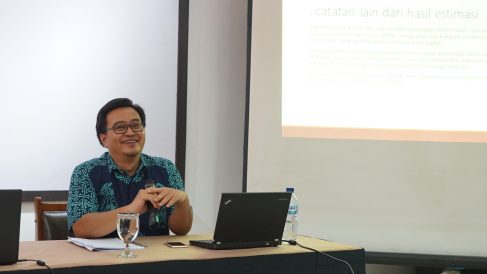Behind Labor Mobility Cost: Evidence In Indonesia
Melva Costanty – Humas FEB
DEPOK – Indonesia is one of a country with a higher estimated labor mobility cost. Labor mobility cost means a cost when a worker has no earning while having an economic shock. For example, a worker has to stop working. Can the worker start a new job? or can they work in another field with another skill? The waiting time when the worker, not works affect their productivity. This is called labor mobility cost.

The labor mobility cost is shared by Taufik Hidayat, a poverty economist, and researcher, on Guest Lecture Session on Population, Distribution, Migration and Urbanization class, Studi Program Master of Population and Labor Economics in Kartono Gunawan Room, Demography Institute Building, Faculty of Economics and Bussines, Universitas Indonesia Depok Campus (08/11/2019).

Taufik shared his study with Massimiliano Cali dan Claire H. Holweg about labor mobility costs for World Bank Group. “This study investigates correlates of the probability of an individual finding job after negative labor market shock, as well as the duration of job search. We want to provide new evidence on the factors that affect labor mobility by using labor data on Indonesia,” he said.
Using the labor data in Indonesia, labor mobility cost investigating by using data micro Survei Tenaga Kerja Nasional (Sakernas) on an individual level, pooled from 2000 to 2016, district classification based on EC-cluster algorithm and Land Scand-2012 population data (World Bank), data from Susenas, PDRB and minimum wage on province level.
The result shows in provinces where individuals rely more on job advertisements workers are less likely to finds a job after having lost theirs, individuals in the urban periphery, as well as single district metros, have the lowest probabilities of finding a job. The opposite is true for individuals in the greater Jakarta area. Individuals in urban periphery and single district metros have the longest time spent looking for a job. Job advertisement does not appear effectively to help labor mobility in Indonesia.
Taufik also shared another result that individuals that graduated from vocational school have longer waiting time to find a job than individuals graduated from general high school, meanwhile vocational school actively built, especially in the rural area. “This is can become a suggestion to the government to make a vocational school joining with the employer. For example, an automotive factory. So after they graduated, they can automatically work on the factory,” he added.






The participant of this guest lecture session is the graduated student of Magister Ekonomi Kependudukan dan Ketenagakerjaan (MEKK), Faculty of Economics and Business, Universitas Indonesia. (des)




